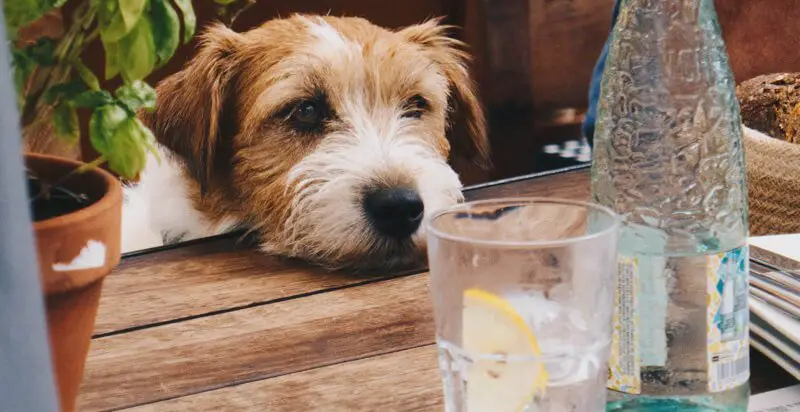What You Need To Know: Is Cold Water Bad For Dogs?

Have you ever felt relief on a scorching day thanks to a refreshing glass of water? It’s a sensation we’re all familiar with! But, have you considered enhancing your dog’s water with some ice cubes?
It’s a simple train of thought. Your dog’s tongue dangling to the floor while panting on a hot, sunny day — so, how about throwing in some ice in water for dogs?
Definitely a simple thought, but dogs and ice water? It’s a challenge to tackle with a direct yes or no. There are health implications and precautions that are necessary to recognize prior to action (which 100% applies to anything and everything you introduce to your dog!).
Don’t worry! We’ll tackle the concept of ‘dog and ice water’ with general introductions, health warnings, dangers and precautions, and the right way to do it.
Is Ice Water Bad for Dogs?
Water is absolutely a primal factor in hydration.
Although at times, the weather and the activity takes a toll to the extent that water just does not seem enough. And that’s where the tempting thought of, “Can I give my dog cold water?” comes in.
According to Dr. DiFazio of Veterinary Emergency and Referral Group in New York City, hydration could be in the form of solid or liquid, and specifically, “Cubes are useful as a means to guarantee water ingestion and can slow the speed at which pets drink water.”
However, like every other thing, ice cubes may have its perks, but they carry their own cons as well.
Circling back, can dogs drink ice-cold water? The answer is yes, but with a number of precautions and potential implications. Furthermore, it is vital to recognize the right way in giving dogs ice water.
A Summer Hack: Giving Dogs Ice?
Let’s weigh out the pros and cons, shall we?
First off, gastric dilatation and volvulus (Canine GDV) is a common condition in deep-chested dogs wherein their stomachs are filled by too much air. In turn, this causes their stomach walls to stretch, hence, dilatation. Further, the dilatation leads to the plausible flipping and twisting of the stomach itself, which is where volvulus comes in. And at this point, surgery is necessary.
It definitely is a severe condition that should induce fear. Although, ice water for dogs does not directly cause GDV. Instead, the act of drinking and consuming the ice-cold water rapidly may result in bloating as they swallow loads of air simultaneously.
In the event of bloat, an optimal response is vomiting. If vomiting does not occur, the chances and risk of GDV increase.
Beyond internal health conditions, first-hand physical damages are also in place.
Countering Dr. DiFazio’s statement, Dr. Susan Nelson of the Veterinary Health Center at Kansas State University, “Ice cubes are a known cause of tooth breakage in dogs.”
Evidently, this instance only occurs as your dog attempts to chew the ice cubes. It’s a whole different story if they attempt to swallow the piece itself. Over time, the incident of choking on ice is rare in dogs, however, it’s safe to recognize the risk.
Deviating from plausible damage and risk, let’s talk about treatment methods.
Common in the summer, enduring a heat stroke or overheating puppers should not be given ice cubes. The right of passage is to cool them down, and this can be achieved with cold water.
Less Ice: Can Dogs Drink Cold Water?
Moving on from, “Can dogs drink ice water?” to, “Is cold water good for dogs?”
As you’ve most likely picked up by now, it’s best to steer clear of solid ice cubes despite Dr. DiFazio’s input. On the other hand, let’s not be hasty in canceling cold water as well.
Some experts may suggest that shaved ice or small cubes should not cause any problems — which makes perfect sense. However, it’s best to eliminate all risks, rather than some risks.
To best prevent GDV when giving cold water to your dog, limit it to small amounts. This ensures the slow, gradual intake that prevents swallowing too much air that leads to bloating. The most susceptible deep-chested breeds to GDV are:
- Great Dane
- Saint Bernard
- Irish Setter
- Wolfhound
- Akita
- German Shepherd
- Doberman Pinscher
- Standard Poodle
- Bouvier
- Old English Sheepdog
- Mastiff
Additionally, after they’ve consumed a significant amount of water, keep them inactive and calm for an hour or two in order to decrease the chances of stomach flipping.
Ice & Cold Water for Dogs: Final Word
“Is ice water good for dogs?” let’s break it down.
It’s safe to say that, ‘good’ isn’t necessarily the best term. To place it bluntly, yes, you can put ice into your dog’s water and there are safer ways to do so. Although, it’s best if you don’t.
The method with minimal risk is providing them with cold water on a hot, summer day. However, it’s vital to stick to small amounts in order to prevent GDV or bloating. Furthermore, keep them inactive for the following hour after ingesting a lot of water to prevent the risk of their stomach flipping.
Keep these reminders and information in mind and you and your furry friend are good to go.
Happy hydrating!
